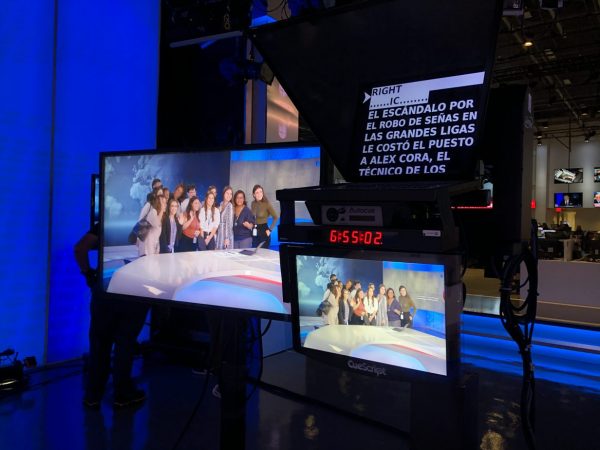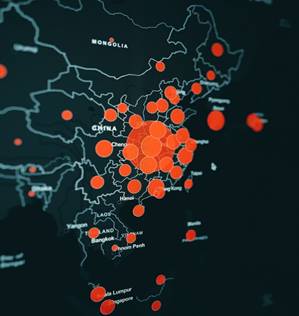Degrees + Programs
More Paths to a Confident Career
The Lee Caplin School of Journalism & Media at FIU offers more than 100 undergraduate and graduate courses that directly prepare you for today’s expanding world of media, from digital platforms to interactive spaces. We tailor curriculums to the specific fields, with highly technical and specialized content that evolves as rapidly as the media. Built on a foundation of ethics, our hands-on style blends traditional best practices with the in-demand skills needed to produce global communicators and media revolutionaries in the 21st century.
By graduation, you are equipped with a diverse portfolio of professional work and the skills to land their dream career as editors, reporters, photojournalists, researchers to copywriters, publicists, communication specialists, lobbyists, video bloggers and more at public, private and non-profit organizations around the world.
The undergraduate program offers a Bachelor of Science in Digital Communication and Media with majors in Digital Journalism, Digital Broadcasting, Digital + Interactive Media, Digital TV + Multimedia Production. The graduate program offers a Master of Science in Communication: Spanish-language Journalism, a bilingual program.

Digital Journalism gives students the critical thinking and technical skills needed to produce digital media content and distribute that content across multiple communication platforms. They will learn how to engage multiple and diverse audiences through a strong foundation in social media and audience analysis to create communication that attains maximum impact. Students in the digital journalism major will master the skills needed to tailor traditional journalism to a social media audience, while continuing to gain experience with traditional news reporting, visual storytelling and production and electronic news reporting and writing.
COURSES
Students in the digital journalism major must complete 60 credits toward the degree. Specialized, major-specific courses include the following:
|
1. JOU 2100 |
Introduction to Reporting and Writing |
|
2. JOU 3003 |
Introduction to Journalism |
|
3. JOU 3117 |
Digital Journalism |
|
4. RTV 3531 |
Multimedia Production |
|
5. JOU 3300 |
Advanced Digital Journalism |
|
6. DIG 4293 |
Multimedia Production 2 |
|
7. JOU 4108 |
Enterprise Reporting |
|
8. JOU4341C |
Integrated Journalism Newsroom |
For detailed view of all course requirements, refer to the Digital Journalism tracksheet.
CAREER PATHS
Students in the digital journalism major can pursue careers as:
· Journalists
· News reporters or correspondents
· News analysts
· News producers
· News Editors
· Copywriters
· Public relations specialists
· Social media managers
· Corporate communications specialists
· Technical writers
DIGITAL BROADCASTING

Students will learn the critical thinking and technical skills needed to produce digital media content and distribute that content across multiple communication platforms. They will engage multiple and diverse audiences through a strong foundation in social media and networking, as well as learn methods and strategies for ensuring their communication attains maximum impact. Digital broadcast majors will learn how to write, shoot, edit, produce and direct video for traditional and digital media platforms.
COURSES
Students in the digital broadcasting major must complete 60 credits toward the degree. Specialized, major-specific courses include the following:
|
1. JOU 2100 |
Introduction to Reporting and Writing |
|
2. JOU 3003 |
Introduction to Journalism |
|
3. JOU 3117 |
Digital Journalism |
|
4. RTV 3531 |
Multimedia Production |
|
5. DIG 4293 |
Multimedia Production 2 |
|
6. RTV 4320 |
Electronic News Gathering |
|
7. RTV 4350 |
Broadcast and Digital Newscast Production |
|
8. RTV 4324 |
Integrated Broadcast Newsroom |
For detailed view of all course requirements, refer to the Digital Journalism tracksheet Broadcast, sound, and video technicians.
CAREER PATHS
Students in the digital broadcasting major can pursue careers as:
· Broadcast news reporters or anchors
· Entertainment reporters
· Broadcast news analysts
· Program producers
· Film and video editors
· Announcers
DIGITAL + INTERACTIVE MEDIA

The Digital + Interactive Media major provides a foundation for students in data visualization and creating data-driven narratives for public communication. Combining critical and cultural aspects of social media, the degree offers hands-on instruction in web analytics and content creation. Students in this major can expect to take courses in interactive media, motion graphics, digital theories, visual design and more.
COURSES
Students in the digital + interactive media major must complete 60 credits toward the degree. Specialized, major-specific courses include the following:
|
1. DIG 3001 |
Introduction to Digital Media |
|
2. RTV 3531 |
Multimedia Production |
|
3. DIG 3110 |
Interactive Media 1: Producing for the Web |
|
4. DIG 3181 |
Interactive Media 2: Visualizations |
|
5. DIG 3146 |
The Social Media Audience |
|
6. DIG 4394 |
Motion Graphics |
|
7. DIG 4800 |
Digital Theories |
|
8. DIG 4293 |
Multimedia Production 2 |
|
9. DIG 4552 |
Advanced Multimedia Capstone |
For a detailed view of all course requirements, refer to the Digital Journalism tracksheet.
CAREER PATHS
Students in the digital + interactive media major can pursue careers as:
· News data analysts
· Social media managers
· Graphics designers
DIGITAL TV + MULTIMEDIA PRODUCTION

The Digital TV + Multimedia Production major allows for a course of study in 21st Century television and multimedia communication. Students gain updated fundamentals in the industry’s best practices as well as training in studio production and writing for television.
COURSES
Students in the digital TV + multimedia production major must complete 60 credits toward the degree. Specialized, major-specific courses include the following:
|
1. RTV 3007 |
Introduction to Television |
|
2. RTV 3511 |
Video Studio Production |
|
3. RTV 3531 |
Multimedia Production |
|
4. DIG 3110 |
Interactive Media 1: Producing for the Web |
|
5. DIG 3253 |
Digital Audio and Social Media Production |
|
6. RTV 4101 |
Writing for Video Production |
|
7. DIG 4394 |
Motion Graphics |
|
8. DIG 4293 |
Multimedia Production 2 |
|
9. DIG 4552 |
Advanced Multimedia Capstone |
For detailed view of all course requirements, refer to the Digital Journalism tracksheet.
CAREER PATHS
Students in the digital TV and multimedia production major can pursue careers as:
· Broadcast news reporters or anchors
· Broadcast news analysts
· Program producers
· Film and video editors
· Broadcast, sound, and video technicians
· Camera operators
· Social media managers
· Graphics designers
· Writers
Journalism + Multimedia Specialization
- Bilingual training in electronic and digital media
- Digital video-editing and multimedia production
- Investigative journalism and data management
- Internships in radio, television, print and digital journalism in local, national and international media
This is a one-of-a-kind program offered in Spanish, but it is also bilingual. You can choose to present your projects in Spanish or English. If you study the Latin American and Caribbean Studies specialization, those lectures are in English. That is also the case for the elective courses. That is why the TOEFL exam is required.
The program, designed to start in the Fall, may be completed in one year and consists of 36 credits (12 courses of three credits each). Two electives courses can be taken outside of the School of Communication + Journalism (SCJ). Each course is offered once a year in the semester as indicated in the link below, except for the Final Professional Project, which is offered in the Fall, Spring and Summer terms.
Spanish-Language Journalism and Multimedia Course Description
Latin American + Caribbean Studies Specialization
If you are interested in covering bilingual Latin American and Caribbean issues, this program is for you.
You will have the opportunity to specialize in areas of political science, sociology and anthropology. This interdisciplinary program will enable students to delve into the political and historical Latin American and Caribbean context of the stories they will cover as reporters.
Four courses are offered in English through FIU’s Kimberly Green Latin American and Caribbean Center (LACC) and eight courses are offered in Spanish by the SCJ faculty.
The program consists of 36 credits (12 courses of three credits each). The professional project can be completed in Spanish or English, and it will be supervised and graded by faculty members of SCJ’s Spanish-Language Journalism Master’s Program.
Spanish-Language Journalism in Latin American and Caribbean Studies Course Description
